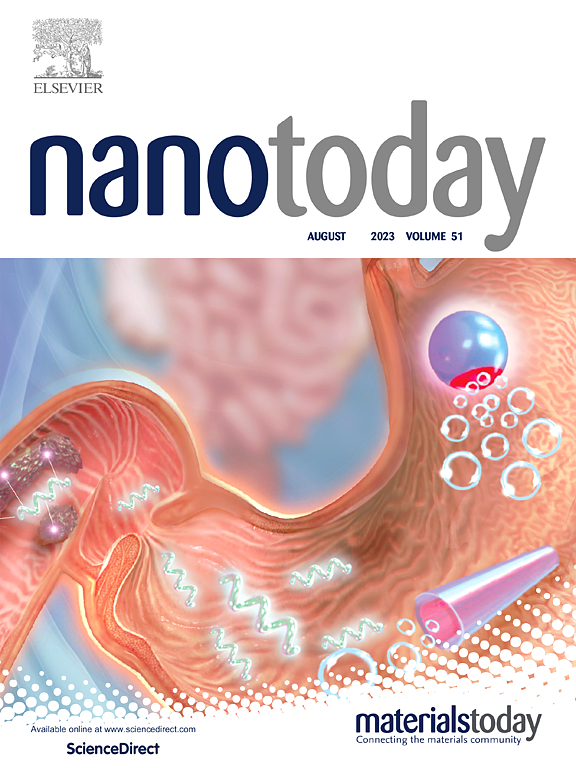免疫化疗纳米颗粒抑制胰腺导管腺癌促癌成纤维细胞亚型
IF 13.2
1区 材料科学
Q1 CHEMISTRY, MULTIDISCIPLINARY
引用次数: 0
摘要
癌相关成纤维细胞(CAFs)和免疫抑制微环境在胰腺导管腺癌(PDAC)的进展中起重要作用。肌成纤维细胞CAFs (myCAFs)和抗原呈递CAFs (apCAFs)是促癌成纤维细胞(CPF)亚型,可促进致密细胞外基质(ECM)的形成,抑制药物渗透,诱导免疫抑制微环境。抑制CPF亚型可能有助于提高PDAC的治疗效果。本文采用包被吉西他滨(BMN/GEM@PE)外泌体的BSA-MnO2-Niclosamide纳米颗粒构建cpf抑制纳米颗粒,通过抑制STAT3/p-STAT3信号,有效抑制PDAC的进展和肝转移。纳米颗粒可以显著降低促癌CAF亚型(myCAFs和apCAFs)的比例,从而诱导从免疫“冷”肿瘤向“热”肿瘤表型的转变。纳米粒子减少的myCAFs可促进药物的渗透和CD8+ T细胞的浸润,apCAFs的减少导致调节性T细胞的减少。新的纳米颗粒治疗策略表明,cafs亚型调控可能会影响肿瘤免疫微环境,这为改善PDAC的免疫化疗提供了机会。本文章由计算机程序翻译,如有差异,请以英文原文为准。
Immunochemotherapeutic nanoparticles inhibit cancer-promoting fibroblasts subtypes for pancreatic ductal adenocarcinoma
Cancer-associated fibroblasts (CAFs) and immunosuppressive microenvironment play important roles in the progression of pancreatic ductal adenocarcinoma (PDAC). Myofibroblast CAFs (myCAFs) and antigen-presenting CAFs (apCAFs) are cancer-promoting fibroblast (CPF) subtypes which could promote dense extracellular matrix (ECM) formation to inhibit drug penetration and induce the immunosuppressive microenvironment. The inhibition of CPF subtypes may help improve the PDAC treatment efficacy. Herein the engineered CPF-inhibiting nanoparticles are constructed with BSA-MnO2-Niclosamide nanoparticles coated with exosomes encapsulating gemcitabine (BMN/GEM@PE) to substantially inhibit the progression and liver metastasis of PDAC by inhibiting the STAT3/p-STAT3 signals. The nanoparticles could significantly reduce the proportion of cancer-promoting CAF subtypes (myCAFs and apCAFs), which induce a shift from immune "cold" tumor to "hot" tumor phenotype. The reduced myCAFs by nanoparticles could promote the drug penetration and the infiltration of CD8+ T cells, and the decreased apCAFs lead to the decrease of the regulatory T cells. The new nanoparticles-based treatment strategies that the CAFs-subtypes modulation may influence the tumor immune microenvironment, which provide an opportunity to improve the immunochemotherapy for PDAC.
求助全文
通过发布文献求助,成功后即可免费获取论文全文。
去求助
来源期刊

Nano Today
工程技术-材料科学:综合
CiteScore
21.50
自引率
3.40%
发文量
305
审稿时长
40 days
期刊介绍:
Nano Today is a journal dedicated to publishing influential and innovative work in the field of nanoscience and technology. It covers a wide range of subject areas including biomaterials, materials chemistry, materials science, chemistry, bioengineering, biochemistry, genetics and molecular biology, engineering, and nanotechnology. The journal considers articles that inform readers about the latest research, breakthroughs, and topical issues in these fields. It provides comprehensive coverage through a mixture of peer-reviewed articles, research news, and information on key developments. Nano Today is abstracted and indexed in Science Citation Index, Ei Compendex, Embase, Scopus, and INSPEC.
 求助内容:
求助内容: 应助结果提醒方式:
应助结果提醒方式:


